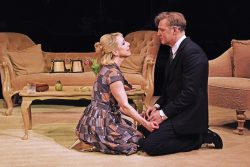 HAROLD Pinter almost single-handedly invented the “theatre of menace”, and his successors took up the idea and ran with it. Watching his early 1960s television play The Lover again, in the brilliant production by Lindsay Posner currently on stage at the intimate Ustinov Studio in Bath, I couldn’t help but feel that he had invented the concept of the “date night” (or at least date afternoon) too.
HAROLD Pinter almost single-handedly invented the “theatre of menace”, and his successors took up the idea and ran with it. Watching his early 1960s television play The Lover again, in the brilliant production by Lindsay Posner currently on stage at the intimate Ustinov Studio in Bath, I couldn’t help but feel that he had invented the concept of the “date night” (or at least date afternoon) too.
The play is part of a double bill with The Collection, and much has been written about both in the intervening years, as Pinter’s star ascended and literary critics as much as theatre reviewers vied for superlatives to describe the content and language of his innovative plays. They are undoubtedly challenging and rewarding for actors, and the quartet assembled in Bath for this double bill could hardly be bettered.
David Morrissey, known for a range of television parts, vividly shows that his understated, multi-layered performance style is ideally suited to theatre, and to the roles of Richard in The Lover and the very different Harry in The Collection. He is evenly matched by Claudie Blakley, and both move seamlessly into the second play to be joined by Mathew Horne and Elliot Barnes-Worrell.
 That “menace” is a constant thread. In The Lover it’s sometimes a turn-on, sometimes evidence of an imbalance of power that is always there for the wielding. In The Collection, it’s tied up in mystery (who IS this man on the phone?), in threat and in the multiple varieties of “truth.” Pinter wrote and talked constantly about the search for truth in his plays.
That “menace” is a constant thread. In The Lover it’s sometimes a turn-on, sometimes evidence of an imbalance of power that is always there for the wielding. In The Collection, it’s tied up in mystery (who IS this man on the phone?), in threat and in the multiple varieties of “truth.” Pinter wrote and talked constantly about the search for truth in his plays.
Perhaps it is simplistic to explain them in a different way. For me, Pinter is the only playwright I can think of whose work forces the audience to think about HIM and HIS PSYCHOLOGY rather than the characters, motivations and lives of the people on stage. In The Lover, Richard plays along with the “little woman” until he decides he’s had enough of the game. It is his decision.
 The Collection depends on the truth of what happened in Leeds. This production had the added complication of three men who, to all intents and purposes, would be more interested in each other than in the woman, who took her solace from a delightful white kitten. It could be seen as a stereotypical caricature of male power and justification of apalling behaviour, but you’d never accuse Pinter of that – not with all his literary trappings.
The Collection depends on the truth of what happened in Leeds. This production had the added complication of three men who, to all intents and purposes, would be more interested in each other than in the woman, who took her solace from a delightful white kitten. It could be seen as a stereotypical caricature of male power and justification of apalling behaviour, but you’d never accuse Pinter of that – not with all his literary trappings.
If you are a Pinter fan, this will probably delight you. For the many students in the audience it will be revelatory. You will see some very fine, nuanced acting from four performers who play it in period, for real, with huge conviction and style, enhanced by a clever musical score and the intensity and intimacy of the venue.
It’s on until 20th April, and a few seats are still available.
GP-W
Photographs by Nobby Clark